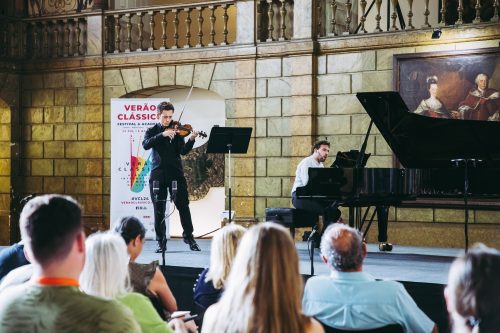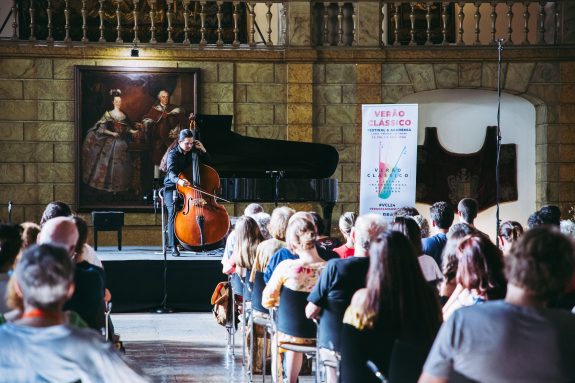 Portugal Verão Clássico Festival & Academy 2024 [4] – TalentFest Concerts I-IV: 54 players (violin, viola, cello, double bass, clarinet, flute, accordion, piano). Museu Nacional dos Coches, Lisbon, 24, 25, 26 & 30.7.2024. (LV)
Portugal Verão Clássico Festival & Academy 2024 [4] – TalentFest Concerts I-IV: 54 players (violin, viola, cello, double bass, clarinet, flute, accordion, piano). Museu Nacional dos Coches, Lisbon, 24, 25, 26 & 30.7.2024. (LV)

For ten years, more than a thousand young musicians have found a platform for launching their careers at the Verão Clássico Festival & Academy in Lisbon. In the last two weeks of July 2024, the tenth edition brought together more than 200 musicians from thirty countries, many of them already working professionally. They took master classes with internationally renowned musicians and professors chosen by Filipe Pinto-Ribeiro, the Verão Clássico’s founder and artistic director, for their deep commitment to sharing and the excellence of their art. In the relaxed Lisbon manner, friendships were made easily as teachers, students and the public came together. It was international diplomacy through cultural interaction, in this case with youth and the future of classical music, at the highest level.
The students gave six concerts of short recital pieces and movements from concertos, and I attended the first four. The Academy awards for each of the instrumental groups have been posted on the Festival’s Facebook Page, and here are my notes about some of the most memorable moments. The performances were scattered over the four nights, and I have grouped them by instrument, and in no special order, for convenience.
Among the violinists, Alfonso Pinto-Ribeiro caught the conflict in the soul of a Grieg sonata, with a haunting and sweet small tone. Filipe Fernandes played Szymanowski with rich, passionate sound, expressive dynamic range and a variety of color. Xunyue Zhang’s Ysaÿe got right to the point, her pizzicatos were poetry, her temperament was fiery. Arieta Liatsi in Franck was passionate and earthy, with romantic phrasing, a wonderful tempo for the second subject and superb pacing. Wenlan Jackson took over Saint-Saëns with command and magnificent scope.
Violist Gustavo Rebelo in an Andante from one of Bach’s Violin Sonatas had an ingenious viola da gamba way of handling broken chords, creating a world of Bach in one movement. Liav Kerbel showed virtuosity both light-hearted and fierce in Haydn. Cellist Emanuel Reber played Ligeti like a poet, affirming his status as modern-day Bach, sensitive to the smallest details with a lyrical sense.
The clarinetists were in a class by themselves, students of the great Pascal Moraguès from the Orchestre de Paris. João Sousa in Poulenc was a crowd favorite. Guilherme Batalha in a Verdi potpourri produced dazzling colors and liquid virtuosity, with elegant phrasing and seductive trills.

The double bassists, students of Janne Saksala, the Berlin Philharmonic’s principal, formed a cool group who checked out even the non-double bass master classes and went to all the concerts. Raul Represas transformed an Andante by Koussevitzky into the love song of an amatory moose, revealing the instrument’s exceptional lyrical side. Yunliang Qiu in Bottesini was sweet and elegant, with a lovely middle register. Lidong He in Bottesini spun out a seamless vocalise, and Amelia Cherry found the intense beauty in an Elegia by Marangoni. Pedro Carvalho mostly tamed the challenges of Emil Tabakov’s Motivy.
The accordion was making its first appearance at Verão Clássico thanks to Norwegian virtuoso Geir Draugsvoll. Thirteen-year-old João Dionisio never let up in a relentless tour de force by Davor Bobić which could have been the soundtrack for silent film comedy. Luca Bello in a short, brilliant lyric by Martin Lohse took off with a theatrical swirl of his head. Rafael Nunes held the audience breathless with Bruno Mantovani’s ‘8’20” Chrono’. The charismatic Gemini Duo (Wanxu and Wanchen Zhao) gave the orchestral version of the ‘Shrovetide Fair’ from Stravinsky’s Petrushka a run for its money in terms of symphonic size, variety and color, with deeply touching phrasing of the solo dances.
Each of the pianists had something impulsive, illuminating and true to say about the music they played. Jacopo Ramos Casariego in Op.10 No.2 was the young lion Beethoven: exhilarating, youthful, his phrasing was sublime and his rolling trills spun out into time. Hyein Joon’s Beethoven sang, and Lena Josephine Majewski in Mozart had a lilt and an ear for the edges of dissonance that Mozart would have loved. Aliya Assanova in Mozart, as did many of the others, made me regret she took no repeats.
Manuel Prata in the opening movement of Beethoven’s Op.110 had a clarity of voice, sense of size and gentle touch at the harmonic changes – he played the silences too. Pau Hernandez in Scriabin was immersed in the climaxes when the music seemed to tumble out of him. Alma Shapiro in Brahms bubbled and then burst like a cauldron leading to large amounts of poetry. Roni Levy was powerfully impressive in Bach’s ‘Chromatic Fantasy and Fugue’.
Regrettably, there was little chamber music, but Ziutong Liu, Eduardo Alcantara and Gonçalo Perdigão in Piazzolla and Leonardo Guedes, Guilherme Duque and Duarte Bento in Paul Schoenfield showed what collaborative treasures could be explored in future festivals.
Laurence Vittes
24.7.2024 – TalentFest Concert I: Various players on different instruments in music by Beethoven, Mozart, Davidoff, Hindemith, Schubert, Vierne, Bruno Mantovani, Giovanni Maria Marangoni, Liszt, Bach and Saint-Saëns.
25.7.2024 – TalentFest Concert II: Various players on different instruments in music by Mozart, Scriabin, Fauré, Koussevitzky, Davor Bobić, Szymanowski, Ligeti, Brahms, Teppo Hauta-aho, Chopin and Ysaÿe.
26.7.2024 – TalentFest Concert III: Various players on different instruments in music by Mozart, Beethoven, Franck, Emil Tabakov, Ysaÿe, Bach, Piazzolla, Martin Lohse, Bottesini, Brahms, Scriabin and Stravinsky.
30.7.2024 – TalentFest Concert IV: Various players on different instruments in music by Bach, Beethoven, Pierre-Octave Ferroud, Poulenc, Lutoslawski, Frank Martin, Paul Schoenfield, Liszt, Donato Lovreglio, Fauré, Grieg and Haydn.